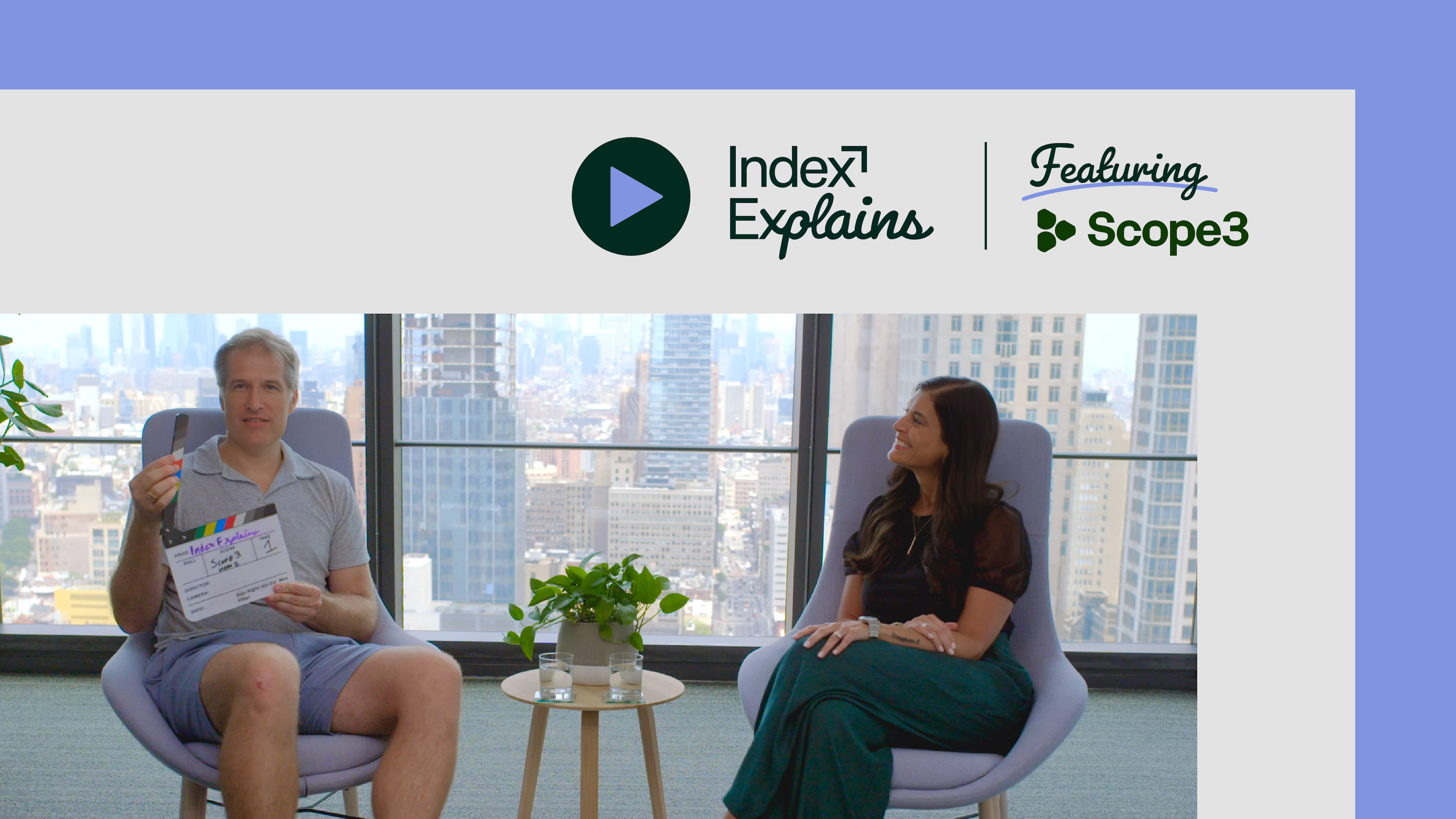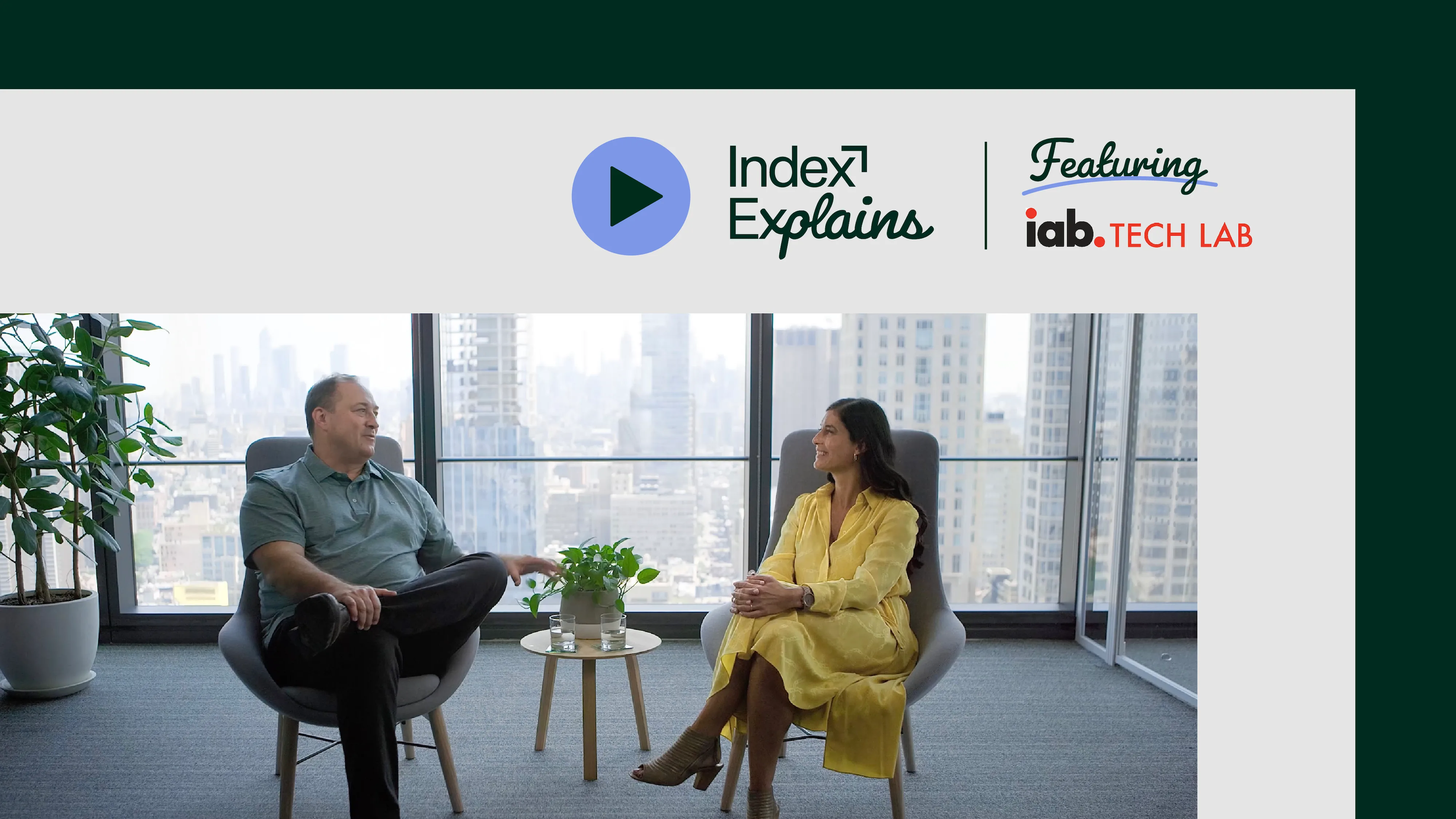Video transcript
Lori Goode: There’s an increased urgency for the advertising industry to reduce its carbon footprint now, and ultimately achieve real net zero. I’m Lori Goode, chief marketing officer at Index Exchange, and I’m joined today by John Osborn, who is the US director of Ad Net Zero.
Welcome, John. Thanks for being here.
John Osborn: Lori Goode, it is great to be here.
LG: So John, the climate emergency affects each and every one of us. What role can the advertising industry play in driving positive change?
JO: I like the way you framed it because it does affect and it involves all of us. But given that we work in the advertising industry, I think it’s important for us to do this because it’s great from an industry standpoint—and it’s great from an industry standpoint in that we as an industry serve clients, the big advertisers out there are going to need this more than ever. But also, let’s just be clear here. If you look back over history, and if you look at big issues, big problems, big moments of crises, the advertising industry has shown that when it comes together, it can do amazing things. It can restore spirits. It can restore economies. And it can help get everything moving in the right direction.
This is a little bit of a different crisis in that it’s not always so much of a clear and present danger, but it’s a huge danger. You know, the 1.5 degrees Celsius that came out of the Paris Agreement affects each and all of us. And it’s incumbent on each and all of us to do our part.
Now, the advertising industry, sometimes it gets the knock that, hey, advertising, how many carbon emissions are there really generated from the advertising industry? There’s actually a lot more than you think because when you break it down, which is what we’ve done at Ad Net Zero,
You can see that there is a fair amount of carbon emissions being generated in certain aspects, like production and through travel. In media, if you want to break that down, media can be very complex, but in the digital media arena there’s a lot of carbon. And then we sit in the United States. The US market is, roughly give or take, over 40% of the worldwide carbon emissions.
So it’s really important from an industry perspective because we serve clients and they need this, and we have to show that we can get our own house in order. And it matters because we need to, as an industry, take action to better our own future and for the futures of the people that work in the industry as well. Let’s not forget them in addition to everything else that we talked about. So it’s a really important, important cause here.
LG: Yeah, absolutely. Emerging regulations are really increasing that urgency for the industry to improve sustainability. What do you think, and does Ad Net Zero think, that it will take to get to real net zero?
JO: Well, let’s define what getting to real net zero really means, because there is managing net zero and then there’s really achieving net zero. Net zero is the balance between the amount of carbon emissions being produced throughout an entire supply chain by the people that work in a company or in an association or in an industry, and whatever can’t be removed by changing actions. We need to find other ways of compensating for that and removing that carbon.
Now the good news is, that a lot of companies are already on their own pathway to achieving that. Roughly, I think the latest statistic I saw was over 30% of the worldwide companies out there have publicly disclosed that they’re on this journey. And this is also something that’s near and dear to Ad Net Zero as well. We are going to require the public dissemination of getting real science-based targets in place for the companies that we work with—and I know that’s something that we’ve talked about as well. We think it’s definitely achievable, but it starts by getting on the journey.
And if companies are wondering or worried about how to go about doing that, we invite them to come talk to us. That’s how most people find their way to Ad Net Zero. They usually come to us and they say, “Look, we’re interested. We know it’s important to get on our own pathway to achieve net zero. We don’t know how to take the first step.” Come to us, a lot of what we do is very educational in origin and the other part is very action-oriented. And that’s the difference with Ad Net Zero. We’re not like a check-the-box kind of an association or organisation. We are an action-oriented organisation that is committed to taking real action.
So, we can do it. We have the power. But, the only way it can be achieved is if we work together. It’s a complex industry—from the creators through the distributors of the content that we make and the whole ecosystem. It’s pretty complex.
But if we come together, the suppliers talk to the publishers, the publishers talk to the suppliers, the agencies talk to their suppliers, and so on and so forth, if we get everybody talking and sharing best practices and making those first steps, we can learn from those first steps, and we can accelerate the momentum towards achieving true net zero, which is what I think we all really want to—I don’t think, I know—it’s what we all want to achieve.
LG: That’s right. So, you mentioned the actionability part that’s core to what Ad Net Zero is trying to do, and you mentioned also the five-point action plan to help meet that goal of net zero. Can you tell us about why you landed on these five dimensions and how they’ll drive progress for the industry?
JO: That’s a great question. I will address that, but let me just put a stake in the ground with what Ad Net Zero really is. There’s a lot of confusion out there, just in general, when folks start talking about climate action or the climate emergency. Ad Net Zero is not a company. There are great companies out there, some of whom you’ve already talked to as part of this series, which is great. There are other associations out there that are related to the advertising industry like the ANA, the 4A’s, the IAB, and the IAB Tech Lab and our friend Tony. They’re doing a great job.
We kind of sit in the middle. We are a nonprofit, new trade association, with the only mission really being about identifying and taking action against a common measurement framework. There’s a lot of buzz out there about, like, standards and being the police, and we’re not any of those things. We are driven to achieve trying to create clarity out of the chaos that exists in the marketplace right now. There’s a lot of confusion. We’re here to help clean it up, to identify what are the true actions related to achieving a common measurement framework. One measurement framework—not 500—one measurement framework against which we can truly set benchmarks and start to measure, report, and reduce carbon emissions associated with the industry.
We wound up with these five action groups because it was the best way that we could get our arms around the complexity of the industry, and we broke it down into five simple working groups.
- One is sort of a general get-your-house-in-order group. They take a look at ways of mitigating carbon associated with energy, and waste, and recycling, and broadly based travel. Travel, by the way, spoiler alert, is a huge culprit in driving high carbon emissions.
- Then we have a whole production-oriented working group and we have a calculator there, and we have training there as well. It’s called ADGreen. We also are proud to partner in the US with Green The Bid, and we’re making a lot of great steps with that community as well.
- Then there’s the media working group, working group three. We partner with the IAB Tech Lab and we’re partnering with GARM. GARM has come in globally to partner with Ad Net Zero, and big thanks to Rob Rakowitz for his work there. Our goal is to try and create and publish these measurement frameworks for media, inclusive of programmatic, by the end of this year.
- And then we have an event and an activation and an awards working group, which is group four. We work with isla and TRACE.
- Then we have a fifth group, which is long-term behaviour change, working on some of the innovation that comes out of the first four.
So we’ve got these five working groups. We don’t usually talk about that, because even that gets confusing. That’s sort of behind the curtain, but it enables us to make real progress against the core chunks that represent the broader ecosystem, all of which roll up into something that we’re trying to achieve as soon as we possibly can, which is one consolidated, coordinated measurement framework whereby the industry can measure its own track record and its own performance.
LG: I think that was a big draw when we first had conversations, I don’t know, six months ago or so, about Ad Net Zero, to have a seat at the table, to collaborate across the industry, to land on the right sets of metrics, and not get too far ahead or too out of balance with what the rest of the industry is doing. And that collaboration piece is so important.
And I think the other part that really resonated for me, that you’ve been talking about for as long as we’ve been talking about this, is progress over perfection, which is almost a way to mentally get over the hurdle of how complex it is and how overwhelming it can feel to just get started.
So, I was wondering if you could break down exactly what media owners, buyers, and platforms should do to get started, and how they can implement these actions and ultimately get on a path to measuring progress.
JO: I think to answer that, the first step I encourage companies to take is to look at themselves, metaphorically speaking, in the mirror. First, understand what the carbon footprint is roughly that they’re currently generating by performing the work that they’re currently doing. So, get a general understanding of where carbon may lie. And then in certain pockets, companies can start to measure—today, in the programmatic space that can help companies measure—and ultimately start to reduce carbon in that particular space.
Now, again, programmatic is a sub-ecosystem within a broader media ecosystem, which is part of the overall advertising ecosystem, but there are ways of measuring today. In production, I mentioned before, we’ve got AdGreen. It’s a calculator. Companies are using that calculator today to help measure carbon emissions as it relates to production jobs, and it’s inclusive of really the whole lifecycle throughout the entire production of a particular job. That’s enabled us to get a lot of data.
Data is important. We certainly know that today. Data allows us to understand where we are as an industry, it will allow a company to understand where the company currently stands today, and then they can start to reduce it.
But you’re right, it’s kind of become cliché: progress over perfection. I like to rephrase it a little bit. And I’m stealing a quote—I’ve been lucky to have some great bosses in my career, but I had one that liked to say, “It’s better to sometimes be roughly right than precisely wrong.” We are in that stage right now. We have enough good things that are starting to happen and where companies can start to take those first steps forward.
But the most important thing, even beyond all of that, is to get educated. Employees want to be educated—we know this; we’ve seen the stats. We know companies want to get educated. We offer educational programs as well through Ad Net Zero, through things like the Ad Net Zero Essentials Training. We offer that up to our supporters, and even possibly non-supporters as well.
So education and action, that’s the name of the game and that’s, I think where suppliers, publishers, agencies, consultancies, every company that touches the advertising ecosystem—they don’t have to be sitting still on the sidelines. They can start to take action, whether it be education or measurement. In the case of programmatic, they can start doing it today.
LG: Okay, John, one final question before we end. What are your final thoughts that you want to convey to everyone listening?
JO: If I’m really being honest, I don’t think we’re moving fast enough. We aren’t moving fast enough. We need to be moving a lot faster.
Even in the last week, we’re sitting here, we’ve had three out of the last five days of the hottest days on this entire planet. As we’re sitting here talking, my texts are blowing up because we have a little cabin up in Vermont. Vermont is washed away—it has gone through the worst flooding, arguably even worse than Hurricane Irene back in the early nineties. So it’s like we’re on the clock here. We need to move forward.
I would just say this: if anybody wants to get involved, if they want to learn how to get involved, if they want to learn about what they can do, what their companies can do, please contact us. We can help put you and your company on the road, on the pathway, towards carbon reduction—real reduction. And it may not be perfect at first, it may be messy at first, but we will help you and your company on the pathway towards achieving that kind of carbon reduction.
And that’s that kind of action–even if it’s not perfect, even if it’s more roughly right than precisely wrong early on—that’s the only way we have a shot at pulling ourselves back from the brink of that tipping point, which is crossing that 1.5 degrees centigrade mark. And we are there. We are knocking on the door. We are in the doorframe right now, but we have the power to come together and pull back. That’s what I would invite anybody who’s nice enough to be watching this video to please, please do. Contact us and we’ll help.
LG: That’s great. John, thank you so much for being here and spending a little bit of time getting started educating the rest of our industry on how they can drive towards a more sustainable future. Thank you so much.
JO: Thanks, Lori Goode. It’s been great talking to you.
Ad Net Zero can help you and your company start on the path toward a more sustainable future today. Learn more about how you can take action here



